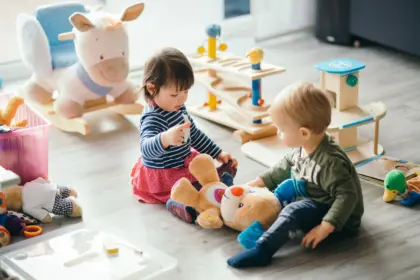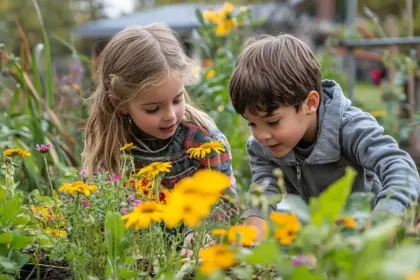13 - 18 Months
I can start to become more independent and expressive.
- Nature Walks: Take them on nature walks to explore leaves, flowers, and animals. This connection with nature can foster curiosity and a sense of wonder. Out and about
- Simple Choices: Offer simple choices, like picking between two toys, to help them feel in control. Making choices can boost their confidence and decision-making skills.
- Story Time: Read picture books together and point out different objects and characters. Reading enhances language development and imagination, join your local library and query what event they might be hosting on a regular basis. Bookstart | BookTrust
- Building Blocks: Provide building blocks to encourage creativity and problem-solving.
- Dance Party: Have a dance party with your toddler to encourage movement and rhythm. Awr o ganeuon Cyw | 1 hour of Welsh songs for children | Caru Canu
CBeebies Songs | Sing with CBeebies Compilation | 30+ Minutes
- Messy Play: Engage in messy play activities like finger painting or playing with playdough to stimulate their senses and creativity. 14 Messy Play Activities to Keep Children Busy and Learning all Year - Ready Steady Let's Get Messy
- Edible Sand. Make edible sand by blending cereal in a food processor for toddler to play with. You can add farm or jungle animal or construction vehicles for imaginative play. This is a great sensory activity which is also safe for consumption if children accidentally consume any. FunSensoryPlay
- Object Exploration. Offer toys that can be pushed, pulled, opened, stacked, or sorted and narrate their actions e.g “you pushed the car!” or “this block is big.” This builds understanding of cause and effect, spatial awareness, and motor control.

19 - 24 Months
I can start to develop a sense of self and others.
- Imaginative Play: Encourage imaginative play with dolls, stuffed animals, or toy kitchens. This type of play helps them understand different roles and scenarios. play-types_2023.pdf
- Art Activities: Provide crayons and paper for drawing and colouring to express creativity. Artistic activities can improve fine motor skills and emotional expression.
- Social Interaction: Arrange playdates with other children to develop social skills. Interaction with peers is important for learning cooperation and empathy. Children in Wales
- Puzzles: Introduce simple puzzles to help them develop problem-solving skills.
- Cooking Together: Involve them in simple cooking tasks like stirring or pouring ingredients. 50 Healthy Recipes to Cook with Toddlers - Eats Amazing.
- Outdoor Exploration: Take them to parks or playgrounds to explore different environments and interact with other children. Out and about
- Read Together. Read with your child and ask them questions whilst doing so e.g “can you find the butterfly?” or “what colour is the sky?”. Reading boosts language development, comprehension, and early literacy skills. Join your local library and query what event they might be hosting on a regular basis. Bookstart | BookTrust
- Helping at mealtimes. Let them help stir the batter, wash fruit, or set the table by giving safe and simple tasks. It teaches life skills, cause and effect, and responsibility.

25 - 36 Months
I can start to become more aware of my emotions and surroundings.
- Gardening: Involve them in simple gardening tasks like watering plants to connect with nature. Gardening can teach responsibility and care for living things. Garden activities for kids: 60 fun things to do with kids at home - Growing Family
- Mindfulness: Teach simple mindfulness activities, like deep breathing or noticing different sounds. Mindfulness can help them manage emotions and develop focus. 5 playful mindfulness exercises for toddlers to help calm and connect - Wholehearted Kids
- Family Time: Spend quality time together, talking about their day and what they enjoyed. Sharing experiences can strengthen family bonds and improve communication. Children 0 to 4 years | GOV.WALES
- Craft Projects: Engage in craft projects like making collages or painting to encourage creativity. 21 Ideas for Crafts with Toddlers | Pampers UK
- Outdoor Games: Play outdoor games like hide-and-seek or catch to promote physical activity. 30+ Outdoor activities for toddlers - The Ladybirds' Adventures
- Storytelling: Encourage them to tell their own stories using pictures or toys to develop their imagination and language skills. Join your local library and query what event they might be hosting on a regular basis. Bookstart | BookTrust
- Social Interaction and Role Play. Play “pretend” games like cooking, caring for dolls, or going to the shop. This is a good way to be playful with your child whist also providing an opportunity to introduce new words. This will enhance language, empathy, and understanding of everyday life.
- Everyday outings. Take your child with you on everyday outings such as food shopping, going to the bank or post office. This will build real-world knowledge and connections whilst encouraging physical movement.
- Expose them to diversity. Read picture books featuring children and families of various races, cultures, abilities, and family structures. “Whose Toes are Those?” by Jabari Asim,“Global Babies” by The Global Fund for Children, and “Baby Goes to Market” by Atinuke are good examples. This helps to build familiarity and acceptance of people who look different from them.
- Celebrate Cultural Music and Food. Play music from different cultures or introduce simple foods from various backgrounds during meals and talk about where the music or food comes from e.g. “this is a drum from Africa,” or “we’re trying rice from India today.” This encourages curiosity and appreciation of other cultures from a young age.
- Encourage Giving and Helping. Let them help choose used toys or clothes to donate to the charity and take them to the shop together. Explain that “some children don’t have many toys so we’re sharing ours to help them.” This fosters compassion and the early concept of helping others.
By taking notice and engaging with your baby or toddler in these ways, you can help them develop a strong foundation for emotional health and wellbeing. Remember, every child is unique, so adapt these tips to fit your child's individual needs and interests.